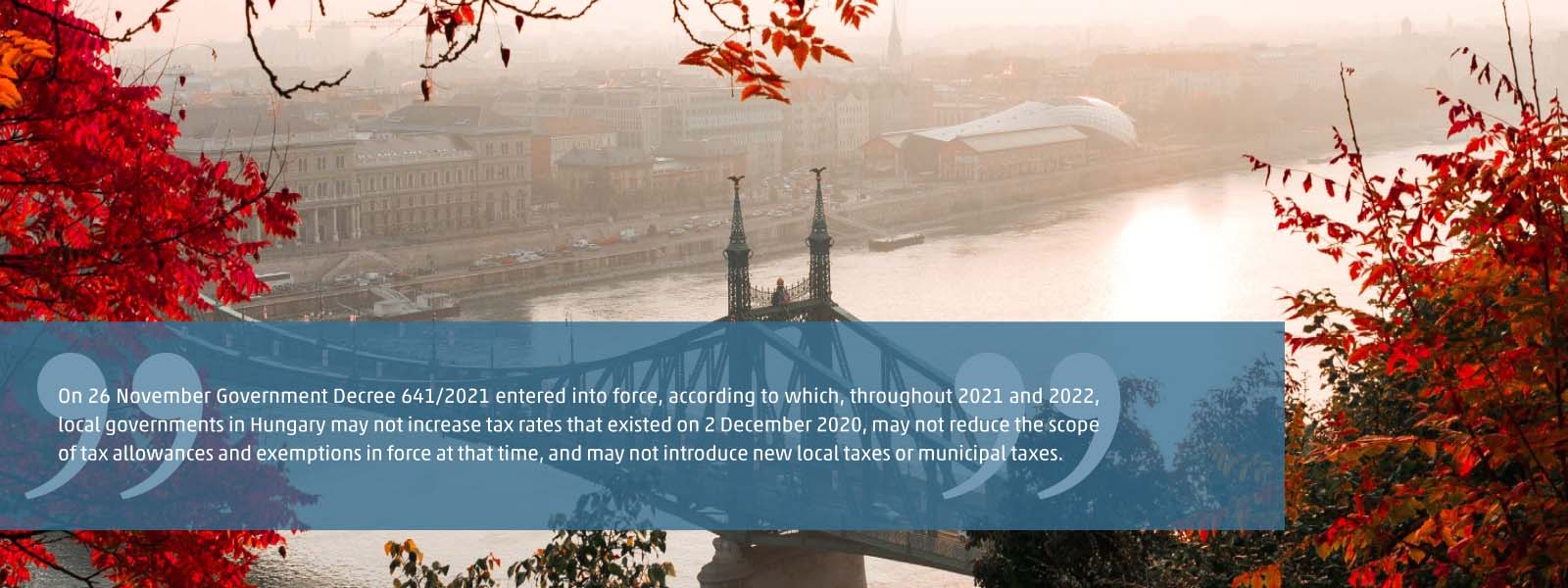On 23 November, the Hungarian government submitted to the National Assembly its new tax law amendments for 2022, mostly tax cuts, in two highly significant bills. The key elements of the autumn tax amendments are summarised below.
Proposal on tax measures necessary to increase minimum wage and guaranteed wage minimum
The two most important elements of bill no. 17668 on the tax measures necessary in connection with the minimum wage and guaranteed wage minimum increase in 2022, and certain other measures, are the extension of the reduced rate of local business tax for SMEs until the end of next year and a further reduction of the social contribution tax. Let’s look at the details.
- Local business tax: The autumn tax amendments would extend the decree promulgated last December and would keep the ceiling for the local business tax rate at 1% for businesses with a sales revenue or total assets not exceeding HUF 4 billion (roughly EUR 11 million) also in the fiscal year ending in 2022. This tax rate rule would be applied for SMEs that choose a financial year other than the calendar year, with respect to financial year starting in 2022. In line with this, Government Decree 641/2021 entered into force on 26 November, according to which, throughout 2021 and 2022, local governments in Hungary may not increase tax rates that existed on 2 December 2020, may not reduce the scope of tax allowances and exemptions in force at that time, and may not introduce new local taxes or municipal taxes. The effect of the reduced tax rate must be applied to the advance instalments due in 2022, in the same way as in 2021. Therefore, by the original due dates only 50% of the tax advance due in 2022 must be paid (i.e. the first advance instalment for 2022 already declared in 2021 based on the tax rate under the local government tax decree, and the second 2022 advance instalment to be declared in 2022 in the return for the 2021 fiscal year, also at the rate in the local government tax decree). The corresponding declaration must be submitted by 25 February 2022 to the National Tax and Customs Administration, which will forward it to the local government of the municipality where the business is registered and where its permanent establishment is known to the National Tax and Customs Administration.
- Employer payables: A further reduction in the social contribution tax would be implemented even earlier and more drastically than proposed in the spring tax law amendments: the rate would be 13% from 1 January 2022 and the 1.5% vocational training contribution would be abolished at the same time, on 1 January. If an individual is liable for social contribution tax on a given income, 89% of the income determined is taken into account as income. Farmers who provide vocational training or dual training would be able to claim a social contribution tax allowance under the rules already adopted. With the reduction of the social contribution tax and the termination of the vocational training contribution, the burden on employers would be reduced by a total of four percentage points next year. As with the social contribution tax, the simplified contribution to public revenues (EKHO) would be reduced to 13% next year from the current 15.5%.
- Small business tax: If the proposal submitted as part of the autumn tax amendments is adopted, the rate of the small business tax (KIVA) will be reduced by another 1% to 10% from 1 January 2022, similarly to previous years.
- Start account: The tax amendments would amend Act CLXXIV of 2005 on the support to young people at the beginning of their career, and would double the state aid for amounts paid into the Start account (baby bond) from HUF 6,000 (roughly EUR 16) to HUF 12,000 (roughly EUR 33). The allowance for children entitled to regular child protection benefits and children fostered in Hungary would also be doubled, from HUF 12,000 (roughly EUR 33) to HUF 24,000 (roughly EUR 66), regardless of the amount paid into the Start account.
Proposal on emergency tax measures
In addition to bill no. 17668, another element of the autumn tax amendments is bill no. 17671, also submitted on 23 November containing certain regulatory issues related to the state of emergency. Among other things, the omnibus bill would amend the rules on remote work in the Hungarian Labour Code and the Personal Income Tax Act, and would transfer the practice of working partly from home – governed only by decrees under the state of emergency – into the normal legal system. The proposal would also change a number of VAT rules. The main tax changes planned are:
- Remote work: In the context of the changes to the rules on remote work in the Labour Code, the Personal Income Tax Act would also be amended. Accordingly, an amount previously defined by the parties from reimbursement paid in connection with remote work – or to an employee at least partly working from home – would qualify as an eligible cost without corroboration up to no more than 10% of the minimum wage each month. If the remote work does not affect the entire month, the cost from the monthly amount accountable without corroboration would be proportionate to the days spent working remotely.
- E-VAT: The proposal repeals the provisions relating to the tax authority offering draft VAT returns, which means companies will have to bid farewell for now to the introduction of the e-VAT system already postponed several times.
- Reverse charging: The reverse charge on the supply of certain cereal and steel products and on the transfer of the marketable right (allowance) on greenhouse gas emissions would be extended in line with changes in EU law. This means that reverse charging would not be abolished in these sectors after 1 July 2022 either.
- Tax exemption: The proposal provides a tax exemption in relation to product imports, purchases of goods and services by the European Commission or an agency or body established under EU law which are necessary for the performance of the tasks assigned to these institutions in order to respond to the coronavirus pandemic. The tax would have to be paid subsequently on goods and services imported and purchased free of tax if the goods are not used for the intended purpose. The exemption would apply retrospectively to transactions carried out after 31 December 2020.
Law on transitional rules in relation to the state of emergency
On 9 November 2021, two weeks before the submission of the autumn tax amendments, the Hungarian National Assembly adopted Act CXV of 2021, which extends the payment relief rules available for businesses. The law allows for the application of special tax relief options until 30 June 2022, regardless of whether or not the options were used this year. Only one of the two options – interest-free payment in instalments or interest-free deferred payment, or an exceptional tax reduction – can be requested in a given year, and in both cases it must be demonstrated that the firm is in difficulty because of the pandemic.
Interest-free payment in instalments for 12 months or interest-free deferred payments for 6 months may be requested for tax debts up to HUF 5 million (roughly EUR 14,000). The tax debt may exceed this limit, but the NAV will only grant relief on the basis of HUF 5 million of tax. Instalment payments and deferred payments are also available for deducted contributions and personal income tax.
The other tax relief option extended by the law is an exceptional tax reduction. Accordingly, if paying the tax debt would make it impossible for the applicant to continue its business activity for reasons attributable to the state of emergency, the tax authority may reduce the tax debt once by 20%, but by no more than HUF 5 million. You can also apply to have tax cancelled for tax debts that the company has deducted from other persons, such as personal income tax or social security contributions.
The law upholding the tax reliefs was promulgated on 17 November.
The autumn tax amendments bring about significant tax changes which will affect most taxpayers. We would like to draw attention particularly to the changes involving the extension of the preferential local business tax rate for SMEs until the end of next year and the further reduction of the social contribution tax. If you have any questions regarding the autumn tax amendments, or their impact, then our tax specialists will gladly help you.










